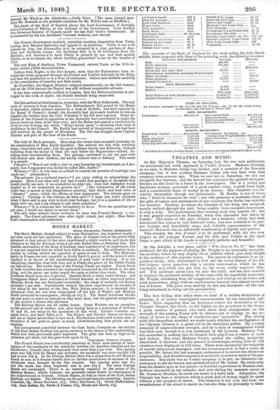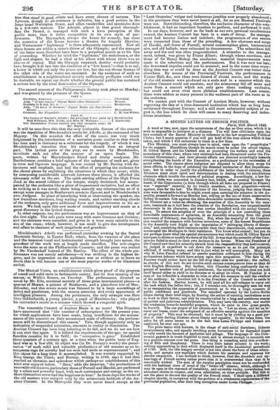The first feeling that arises when we bear of a
sudden destruction of property, is of course unmitigated commiseration for the immediate suf- ferers. Even supposing that an insurance causes the destruction of the Olympic Theatre, this week, to fall lightly on the proprietor or the lessee, a great number of persons who have made their engagements on the strength of the coming Easter will be thrown out of employ, to say no- thing of losses in the shape of wardrobes and "properties." But, setting aside this immediate mischief, we doubt much whether the conflagration of the Olympic Theatre is a great evil to the theatrical public. By a comic company of unprecedented strength, and by a style of management which was then new, though it is now continued at the Lyceum, Madame Ves- trig succeeded in making this ill-situated little playhouse a centre of rank and fashion. But when Madame Vestris quitted the edifice, prosperity abandoned it likewise; and the natural disadvantages arising from its vile situation were displayed in full force. These were assisted by the vulgarity of several subsequent managers, and the house acquired as bad a name as possible. Mr. Spicer, the last manager, endeavoured to restore the theatre to respectability, and therefore stands in honourable contrast to most of his pre- decessors. But there was no Vestris company to be got; no fortuitous cir- cumstance to aid the honest and spirited efforts of Mr. Spicer. He could only keep his theatre open at low prices,—a doubtful experiment in Westminster, however successful in the suburbs; and save during the meteoric career of Mr. Gustavus Brookes, he could not make it a town talk. Altogether, the Olympic has been a structure where a great deal of money might be spent without a fair prospect of return. The situation is not only bad from the wretchedness of the street it stands in, but also from its proximity to thea-
tree that stana in good streets and have every chance of success. The Lyceum, though its pit-entrance is defective, has a good portico in the large broisi Wellington Street, and offers vaudevilles and spectacles done in a first-rate manner. The Adelphi, placed in that grand thorough- fare the Strand, is managed with such a keen perception of the public taste, that it defies competition in its own style of per- formance. The Haymarket, always the house for comedy, has since the accession of the Keens become a theatre for tragedy likewise; and Westminster " legitimacy " is there adequately represented. Now all these houses are within a stone's-throw of the Olympic; and the manager of the latter must therefore have been in a perpetual puzzle as to his line of proceeding. Whether he tried the "legitimate," the melodrama, or the light and elegant, he had a rival at his elbow with whom there was no chance of coping. Had the Olympic remained, destiny would probably have brought it at last into the condition of a "low house,"—that is to say, a house in which not only the prices are low, but the cut-throat dramas of the other side of the water are emulated. As the existence of such an establishment in a neighbourhood already sufficiently profligate could not be desirable, we repeat our doubt whether the general public has sustained a serious loss by the total destruction of the Olympic.



























 Previous page
Previous page